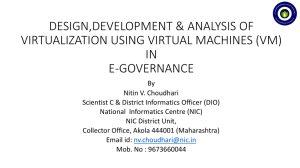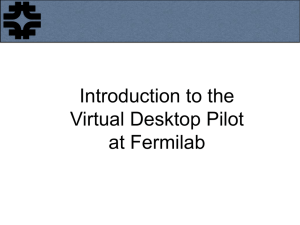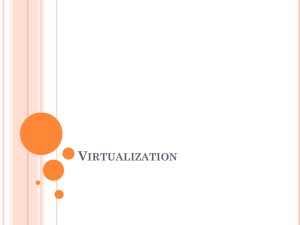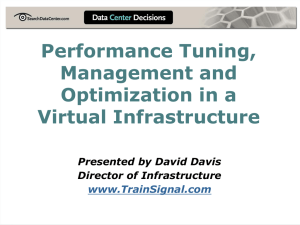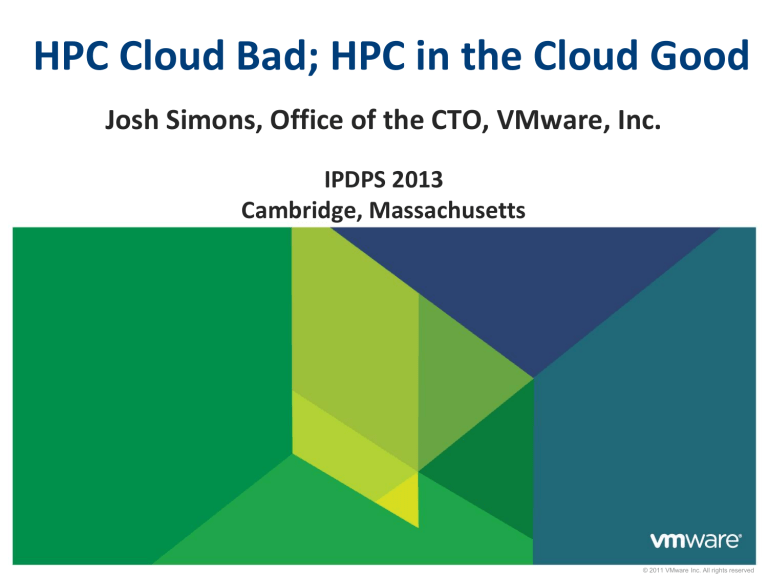
HPC Cloud Bad; HPC in the Cloud Good
Josh Simons, Office of the CTO, VMware, Inc.
IPDPS 2013
Cambridge, Massachusetts
© 2011 VMware Inc. All rights reserved
Post-Beowulf Status Quo
Enterprise IT
2
HPC IT
Closer to True Scale
(NASA)
3
Converging Landscape
Convergence driven by
increasingly shared concerns,
e.g.:
• Scale-out management
• Power & cooling costs
• Dynamic resource mgmt
Enterprise IT
HPC IT
• Desire for high utilization
• Parallelization for multicore
• Big Data Analytics
• Application resiliency
• Low latency interconnect
• Cloud computing
4
Agenda
HPC and Public Cloud
• Limitations of the current approach
Cloud HPC Performance
• Throughput
• Big Data / Hadoop
• MPI / RDMA
HPC in the Cloud
• A more promising model
5
Server Virtualization
Without Virtualization
With Virtualization
Application
Operating System
Hardware
• Hardware virtualization presents a complete x86 platform to the virtual
machine
• Allows multiple applications to run in isolation within virtual machines
on the same physical machine
• Virtualization provides direct access to the hardware resources to
give you much greater performance than software emulation
6
HPC Performance in the Cloud
http://science.energy.gov/~/media/ascr/pdf/program-documents/docs/Magellan_final_report.pdf
7
Biosequence Analysis: BLAST
C. Macdonell and P. Lu, "Pragmatics of Virtual Machines for High-Performance Computing: A Quantitative
Study of Basic Overheads, " in Proc. of the High Perf. Computing & Simulation Conf., 2007.
8
Biosequence Analysis: HMMer
9
Molecular Dynamics: GROMACS
10
EDA Workload Example
app
app
app
app
app
app
OS
OS
OS
OS
app
operating system
hardware
• Virtual 6% slower
• Virtual 2% faster
11
app
virtualization layer
hardware
Memory Virtualization
Virtual
HPL
Native
EPT on
EPT off
4K pages
37.04 GFLOPS
36.04 (97.3%)
36.22 (97.8%)
2MB pages
37.74 GLFLOPS
38.24 (100.1%)
38.42 (100.2%)
virtual
physical
Virtual
*RandomAccess
Native
EPT on
machine
EPT off
4K pages
0.01842
0.0156 (84.8%) 0.0181 (98.3%)
2MB pages
0.03956
0.0380 (96.2%) 0.0390 (98.6%)
EPT = Intel Extended Page Tables = hardware page table virtualization = AMD RVI
12
vNUMA
Application
ESXi hypervisor
M
13
socket
socket
M
vNUMA Performance Study
Performance Evaluation of HPC Benchmarks on VMware’s ESX Server, Ali Q., Kiriansky, V., Simons
J., Zaroo, P., 5th Workshop on System-level Virtualization for High Performance Computing, 2011
14
Compute: GPGPU Experiment
General Purpose (GP) computation with GPUs
CUDA benchmarks
VM Direct Path I/O
Small kernels: DSP, financial,
bioinformatics, fluid dynamics,
image processing
RHEL 6
nVidia (Quadro 4000) and AMD GPUs
Generally 98%+ of native performance
(worst case was 85%)
Currently looking at larger-scale financial
and bioinformatics applications
15
MapReduce Architecture
MAP
Reduce
MAP
HDFS
Reduce
MAP
Reduce
MAP
16
HDFS
vHadoop Approaches
M M
VM
Why virtualize Hadoop?
• Simplified Hadoop cluster
configuration and
provisioning
• Support Hadoop usage in
existing virtualized
datacenters
• Support multi-tenant
environments
• Project Serengeti
17
Node
RRM
VM
MR
VM
VM
Node
Node
HDFS
R M R
Compute
Node
Data Node
Node
CN
vHadoop Benchmarking Collaboration with AMAX
Seven-node Hadoop cluster (AMAX ClusterMax)
Standard tests: PI, DFSIO, Teragen / Terasort
Configurations:
• Native
• One VM per host
• Two VMs per host
Details:
• Two-socket Intel X5650, 96 GB, Mellanox 10 GbE, 12x 7200rpm SATA
• RHEL 6.1, 6- or 12-vCPU VMs, vmxnet3
• Cloudera CDH3U0, replication=2, max 40 map and 10 reduce tasks per host
• Each physical host considered a “rack” in Hadoop’s topology description
• ESXi 5.0 w/dev Mellanox driver, disks passed to VMs via raw disk mapping
(RDM)
18
Benchmarks
Pi
• Direct-exec Monte-Carlo estimation of pi
• # map tasks = # logical processors
• 1.68 T samples
TestDFSIO
• Streaming write and read
• 1 TB
• More tasks than processors
Terasort
• 3 phases: teragen, terasort, teravalidate
• 10B or 35B records, each 100 Bytes (1 TB, 3.5 TB)
• More tasks than processors
• CPU, networking, and storage I/O
19
~ 4*R/(R+G) = 22/7
Ratio to Native, Lower is Better
1,2
Ratio to Native
1
0,8
0,6
1 VM
0,4
0,2
0
A Benchmarking Case Study of Virtualized Hadoop Performance on VMware vSphere 5
http://www.vmware.com/files/pdf/VMW-Hadoop-Performance-vSphere5.pdf
20
2 VMs
Kernel Bypass Model
sockets
rdma
guest kernel
kernel
sockets
tcp/ip
driver
rdma
hardware
21
application
user
user
application
tcp/ip
driver
vmkernel
hardware
rdma
rdma
Virtual Infrastructure RDMA
Distributed services within the platform, e.g.
• vMotion (live migration)
• Inter-VM state mirroring for fault tolerance
• Virtually shared, DAS-based storage fabric
All would benefit from:
• Decreased latency
• Increased bandwidth
• CPU offload
22
vMotion/RDMA Performance
80
70,63
70
RDMA
432 757,73
14.18 Gbps
60
45,31
50
36 %
faster
40
30
30% Higher
10.84 Gbps
TCP/IP
20
330 813,66
10
0
Time (s)
Destination CPU Utilization
23
200000
300000
400000
500000
Pre-copy bandwidth (Pages/sec)
50
45
40
35
30
25
20
15
10
5
0
1:11
1:06
1:01
0:56
0:51
0:46
0:41
0:36
0:31
0:26
0:21
0:16
84 84% Lower
0:11
92% Lower
0:00
0:05
0:11
0:16
0:21
0:26
0:31
0:36
0:41
0:46
0:51
0:56
1:01
1:06
1:11
1:16
% Core Utilization
used by vMotion
50
45
40
35
30
25
20
15
10
5
0
VMware
100000
0:05
Total vMotion Time (sec)
0
0:00
RDMA
% Core Utilization
used by vMotion
TCP/IP
Time (s)
Source CPU Utilization
Guest OS RDMA
RDMA access from within a virtual machine
Scale-out middleware and applications increasingly important in
the Enterprise
• memcached, redis, Cassandra, mongoDB, …
• GemFire Data Fabric, Oracle RAC, IBM pureScale, …
Big Data an important emerging workload
• Hadoop, Hive, Pig, etc.
And, increasingly, HPC
24
SR-IOV VirtualFunction VM DirectPath I/O
Single-Root IO Virtualization
(SR-IOV): PCI-SIG standard
Physical (IB/RoCE/iWARP)
HCA can be shared between
VMs or by the ESXi hypervisor
• Virtual Functions direct assigned to
Guest OS
OFED
Stack
RDMA HCA
VF Driver
VMs
Guest OS
Guest OS
RDMA HCA
VF OFED
Driver
RDMA HCA
VF OFED
Driver
Stack
Stack
RDMA HCA
VF Driver
RDMA HCA
VF Driver
Virtualization
PF Device
Layer
Driver
• Physical Function controlled by
hypervisor
I/O MMU
Still VM DirectPath, which is
incompatible with several
important virtualization
features
VF
VF
SR-IOV
RDMA HCA
VMware
25
PF
VF
Paravirtual RDMA HCA (vRDMA) offered to VM
New paravirtualized device exposed to
Virtual Machine
OFED
Stack
• Implements “Verbs” interface
Device emulated in ESXi hypervisor
Guest OS
vRDMA HCA Device Driver
• Translates Verbs from Guest to Verbs to ESXi
“OFED Stack”
• Guest physical memory regions mapped to
vRDMA Device Emulation
ESXi and passed down to physical RDMA
HCA
• Zero-copy DMA directly from/to guest physical
memory
• Completions/interrupts “proxied” by emulation
I/O
Stack
ESXi “OFED
Stack”
Physical RDMA HCA
Device Driver
“Holy Grail” of RDMA options for
vSphere VMs
Physical RDMA HCA
26
InfiniBand Bandwidth with VM DirectPath I/O
3500
3000
Bandwidth (MB/s)
2500
2000
Send: Native
Send: ESXi
1500
RDMA Read: Native
RDMA Read: ESXi
1000
500
0
2
4
8
16
32
64
128 256 512
1K
2K
4K
8K
16K 32K 64K 128K 256K 512K 1M
2M
4M
8M
Message size (bytes)
RDMA Performance in Virtual Machines using QDR InfiniBand on VMware vSphere 5, April 2011
http://labs.vmware.com/academic/publications/ib-researchnote-apr2012
27
Latency with VM DirectPath I/O (RDMA Read, Polling)
4096
2048
MsgSize (bytes)
Native
ESXi ExpA
2
2.28
2.98
4
2.28
2.98
8
2.28
2.98
1024
Half roundtrip latency (µs)
512
16
2.27
2.96
256
32
2.28
2.98
64
2.28
2.97
128
128
2.32
3.02
256
2.5
3.19
64
Native
ESXi ExpA
32
16
8
4
2
1
2
4
8
16
32
64
128
256
512
1K
2K
4K
8K
16K
Message size (bytes)
28
32K
64K 128K 256K 512K 1M
2M
4M
8M
Latency with VM DirectPath I/O (Send/Receive, Polling)
4096
2048
MsgSize (bytes)
Native
ESXi ExpA
2
1.35
1.75
4
1.35
1.75
8
1.38
1.78
16
1.37
2.05
32
1.38
2.35
64
1.39
2.9
128
1.5
4.13
256
2.3
2.31
1024
Half roundtrip latency (µs)
512
256
128
64
Native
ESXi ExpA
32
16
8
4
2
1
2
4
8
16
32
64
128
256
512
1K
2K
4K
8K
16K
Message size (bytes)
29
32K
64K 128K 256K 512K 1M
2M
4M
8M
Intel 2009 Experiments
Hardware
• Eight two-socket 2.93GHz X5570 (Nehalem-EP) nodes, 24 GB
• Dual-ported Mellanox DDR InfiniBand adaptor
• Mellanox 36-port switch
Software
• vSphere 4.0 (current version is 5.1)
• Platform Open Cluster Stack (OCS) 5 (native and guest)
• Intel compilers 11.1
• HPCC 1.3.1
• STAR-CD V4.10.008_x86
30
HPCC Virtual to Native Run-time Ratios (Lower is Better)
2,5
2
1,5
1
0,5
0
2n16p
4n32p
8n64p
Data courtesy of:
Marco Righini
Intel Italy
31
Point-to-point Message Size Distribution: STAR-CD
Source: http://www.hpcadvisorycouncil.com/pdf/CD_adapco_applications.pdf
32
Collective Message Size Distribution: STAR-CD
Source: http://www.hpcadvisorycouncil.com/pdf/CD_adapco_applications.pdf
33
STAR-CD Virtual to Native Run-time Ratios (Lower is Better)
STAR-CD A-Class Model (on 8n32p)
1,25
1,19
1,20
1,15
1,15
1,10
1,05
1,00
1,00
0,95
0,90
Physical
ESX4 (1 socket)
ESX4 (2 socket)
Data courtesy of Marco Righini, Intel Italy
34
Software Defined Networking (SDN) Enables Network Virtualization
Telephony
650.555.1212
Wireless
Telephony
Identifier = Location
650.555.1212
Networking
192.168.10.1
35
192.168.10.1
VXLAN
Identifier = Location
Data Center Networks – Traffic Trends
NORTH / SOUTH
WAN/Internet
EAST / WEST
36
Data Center Networks – the Trend to Fabrics
WAN/Internet
WAN/Internet
37
Network Virtualization and RDMA
SDN
• Decouple logical network from physical hardware
• Encapsulate Ethernet in IP → more layers
• Flexibility and agility are primary goals
RDMA
• Directly access physical hardware
• Map hardware directly into userspace → fewer layers
• Performance is primary goal
Is there any hope of combining the two?
• Converged datacenter supporting both SDN management and decoupling
along with RDMA
38
38
Secure Private Cloud for HPC
Research Group 1
Research Group m
Users
IT
Public Clouds
VMware vCloud Director
User Portals
Catalogs
Security
VMware vCloud API
Research Cluster 1
Research Cluster n
VMware
vShield
Programmatic
Control and
Integrations
39
VMware
vCenter Server
VMware
vCenter Server
VMware
vCenter Server
VMware vSphere
VMware vSphere
VMware vSphere
Massive Consolidation
40
Run Any Software Stacks
Support groups with disparate software requirements
Including root access
41
App A
App B
OS A
OS B
virtualization layer
virtualization layer
virtualization layer
hardware
hardware
hardware
Separate workloads
Secure multi-tenancy
Fault isolation
…and sometimes performance
42
App A
App B
OS A
OS B
virtualization layer
virtualization layer
virtualization layer
hardware
hardware
hardware
Live Virtual Machine Migration (vMotion)
43
Use Resources More Efficiently
Avoid killing or pausing jobs
Appoverall
C
Increase
throughput
OS A
44
App A
App B
App A
App C
OS A
OS B
OS A
OS B
virtualization layer
virtualization layer
virtualization layer
hardware
hardware
hardware
Workload Agility
app
app
45
app
app
app
app
operating system
virtualization layer
virtualization layer
hardware
hardware
hardware
Multi-tenancy with resource guarantees
Define policies to manage resource sharing between
groups
46
App C
App
App
A A
AppApp
B B
App A
App C
OS A
OS OS
A A
OS B
OS B
OS A
OS B
virtualization layer
virtualization layer
virtualization layer
hardware
hardware
hardware
Protect Applications from Hardware Failures
Reactive Fault Tolerance: “Fail and Recover”
47
App A
App A
OS
OS
virtualization layer
virtualization layer
virtualization layer
hardware
hardware
hardware
Protect Applications from Hardware Failures
Proactive Fault Tolerance: “Move and Continue”
48
MPI-0
MPI-1
MPI-2
OS
OS
OS
virtualization layer
virtualization layer
virtualization layer
hardware
hardware
hardware
Unification of IT Infrastructure
49
HPC in the (Mainstream) Cloud
MPI / RDMA
Throughput
50
Summary
HPC Performance in the Cloud
• Throughput applications perform very well in virtual environments
• MPI / RDMA applications will experience small to very significant slowdowns in
virtual environments, depending on scale and message traffic characteristics
Enterprise and HPC IT requirements are converging
• Though less so with HEC (e.g. Exascale)
Vendor and community investments in Enterprise solutions eclipse
those made in HPC due to market size differences
• The HPC community can benefit significantly from adopting Enterprise-capable
IT solutions
• And working to influence Enterprise solutions to more fully address HPC
requirements
Private and community cloud deployments provide significantly
more value than cloud bursting from physical infrastructure to
public cloud
51


